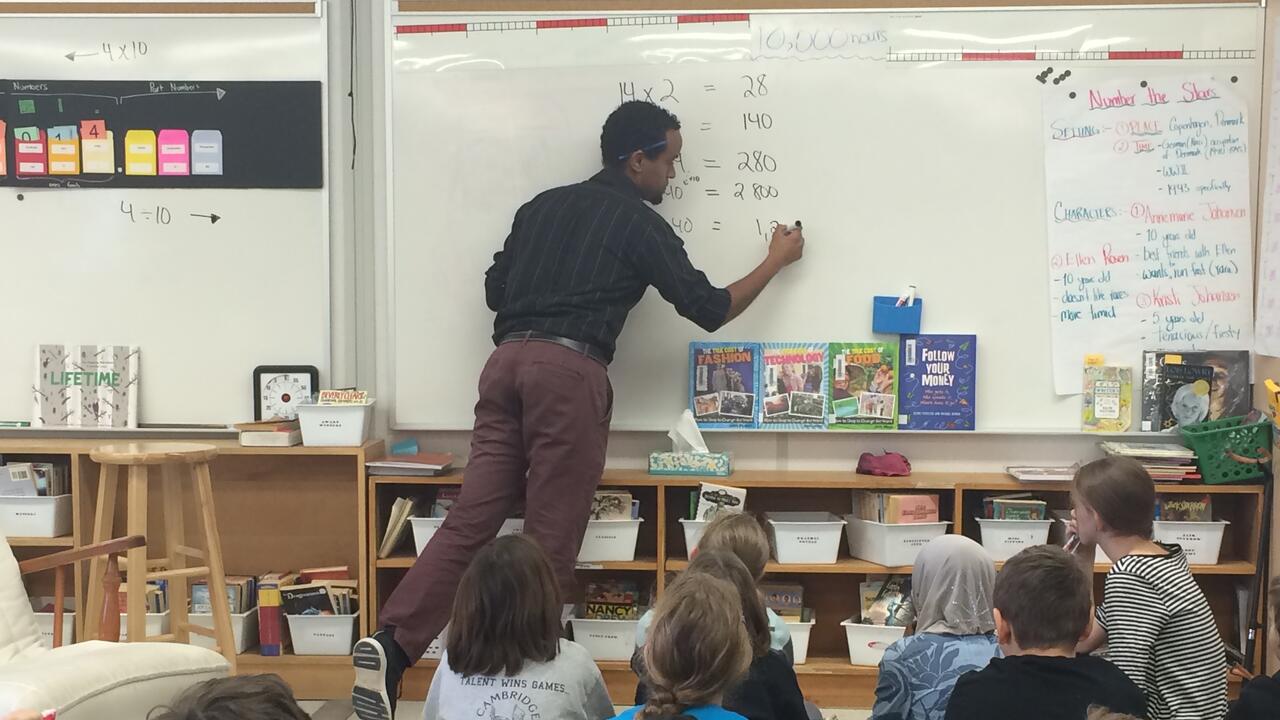
Igniting curiosity and interest in STEM
The new ESQ Kids on Campus program empowers children to realize their potential

The new ESQ Kids on Campus program empowers children to realize their potential
By Charlotte Danby Faculty of Engineering
Hebron Gebre-Mariam (BASc ’07)
Alum, Faculty of Engineering
> Kids on Campus, Engineering Outreach Program
University of Waterloo Engineering alum Hebron Gebre-Mariam (BASc ’07) is an educator with the Waterloo Region District School Board. In 2022, he helped launch Waterloo’s Engineering Outreach program, Kids on Campus, which provides on-campus STEM activities to 8,000 grade four students each school year.
We asked Gebre-Mariam about his inspiration for the program and why early exposure to higher education subjects and environments is important for children’s development and by extension, society at large.
After graduating, I got involved as a camp counselor with the Waterloo Engineering Outreach program – Engineering Science Quest (ESQ) – and was soon delivering the program in classrooms full-time. I loved how experiential it was for the kids. Watching them have fun through active learning was an absolute delight for me. Pursuing a career in education just felt right.
I’m a teacher, but I’m also an engineer. Both callings developed from my experience in and exposure to certain learning environments. As a child, the UC Davis College of Engineering, where my father worked, was my playground. I got to see engineers demo their solar cars in the parking lot while riding my bike. I was surrounded by innovation which so inspired me that I tried to invent motorized rollerblades for a school project. Post-secondary education was not some future unknown, it was my everyday norm, my obvious pathway — particularly in the STEM fields.
Thanks to my work with ESQ, I became a teacher sooner rather than later. My life has been shaped by awesome learning experiences beyond textbooks and classrooms. As an educator, I want children to have these opportunities, too. In partnership with Waterloo Engineering Outreach, the Kids on Campus pilot program kicked off in 2022 with one goal: to bring children onto campus for an immersive learning experience that exposes them to new possibilities and pathways.
The Kids on Campus program runs for 10 months a year and in that period, aims to bring every fourth-grader in the Waterloo region onto the University of Waterloo campus for a day of immersive activities. That’s about 8,000 students from around 160 schools each year. Thanks to support from the wider Waterloo community, one-off grants, donors and diversified financial support from lead sponsor Actua, these field trips are free so that no child is excluded due to cost.
It’s an action-packed day for the children that includes hands-on 3D modelling and coding activities that focus on the engineering design cycle, an interactive tour of the RoboHub and other cool facilities and mentor presentations from sponsors. The children are full of amazing questions and keep the adults – and ‘big students’ as they call the University students – on their toes.
The Waterloo Region is fast-growing and ambitious, home to an impressive amount of community resources such as schools, colleges and universities, commercial development and cultural hubs, all within a condensed radius. Our job as community leaders is to think ahead and build partnerships now that will ensure our society continues to thrive in the future. The success of the Kids on Campus program is an example of this very mindset in action. Children develop their interests through experience and exposure. If they know what opportunities exist and how to access them, know who they can be and how to get there, they are more empowered to realize their potential. Investing in our children as a community enriches us all.

Read more
Opinion: A need for standardized race-based data collection in Canadian health care

Read more
Diversity bolsters knowledge creation and positively advances science and technology for our future

Read more
The FamilyPsycle Lab is preparing future clinicians to offer trauma-informed family therapy
The University of Waterloo acknowledges that much of our work takes place on the traditional territory of the Neutral, Anishinaabeg, and Haudenosaunee peoples. Our main campus is situated on the Haldimand Tract, the land granted to the Six Nations that includes six miles on each side of the Grand River. Our active work toward reconciliation takes place across our campuses through research, learning, teaching, and community building, and is co-ordinated within the Office of Indigenous Relations.